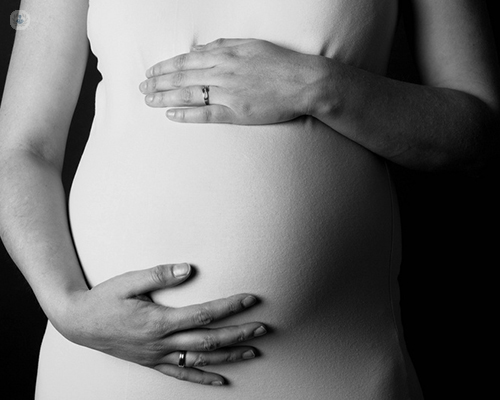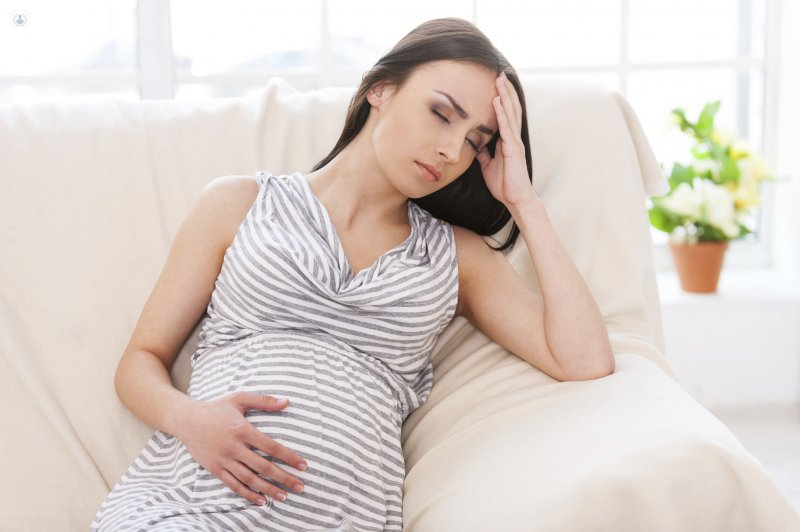Rubella and pregnancy: all you need to know
Written by:Rubella, if contracted in the early stages of pregnancy, is a potentially devastating disease that could cause harm to an unborn baby. However, the illness can be effectively fought off and avoided, and on hand to give us more of an insight into how pregnant women can protect themselves and their unborn babies against rubella is fertility expert, Dr Irfana Koita.

What is rubella and how can one fight it off?
Rubella, also commonly referred to as German measles, is a viral infection that commonly lasts up to a week. The main, most common symptoms of rubella are the following:
- swollen glands in the neck
- aching fingers, wrists and/or knees
- high temperature
The MMR (Measles, Mumps, Rubella) vaccine can effectively fight off rubella and is typically offered to all children in the UK at 13 months old, and once again as soon as they start school. Whilst the infection may cause little or mild symptoms in most people, it can cause serious problems for unborn babies if their mothers are infected by rubella during their pregnancy.
How harmful can rubella be for babies?
Unfortunately, rubella can severely affect an unborn baby’s sight, hearing, heart and brain. However, this may or may not occur, depending on the time of diagnosis. The good news is that it is extremely unlikely that the virus will affect an unborn baby if a pregnant mother catches the virus anywhere after four months of pregnancy.
In the early stages of pregnancy, if the woman develops a rash, it is highly advised that her and her partner or immediate family should discuss this with a doctor as soon as possible. It may be recommended to have a rubella blood test to confirm a diagnosis. It is extremely important to request a blood test prior to falling pregnant to make sure that the mother has antibodies that will lead to and ensure immunity to rubella.

How can one protect themselves and their future family?
The easiest and most effective manner in which to protect yourself from rubella is to ensure that you are fully immunised against the virus prior to trying to conceive. Before you seek to get the MMR vaccination, a blood test will be required in order to check whether you are already immune.
If someone contracted rubella as a child, are they then immune?
One can only be immune to rubella if a blood test confirms so. Rubella can be very difficult to recognise, especially in the case where no symptoms were displayed at the time of experiencing the illness. Therefore, it is always highly recommended to double-check, as rubella and measles can, occasionally, be mistaken for one another.
Is it possible to get a rubella vaccine?
Unfortunately, single rubella vaccinations are no longer available. This is mainly due to the fact that laboratories have, for a substantial amount of time now, been solely putting their focus towards producing the MMR vaccine, as it is now an internationally recognised vaccine of choice.
What if I had the rubella or an MMR vaccine previously, am I still immune?
In the majority of cases, protection through immunisation seems to be long-term. A rubella-containing vaccine has been used for over 30 years and most people who became immunised in the early introduction of the vaccine remain protected. However, no two people are the same and no immunisation protects everybody.
In one in every fifty cases, the immunisation does not work. This may be a result of the body not producing a sufficient amount of protection or antibody, or it also could be due to the fact that the vaccine itself was stored or handled incorrectly.
Can the MMR vaccine be requested if a mother is still breastfeeding?
Fortunately, the MMR vaccine can indeed be safely injected into breastfeeding mothers without any risk to their nursing baby. There is no evidence to suggest that any of the MMR viruses are being found in mothers’ milk. To give a pregnant mother extra reassurance, even if they were present in the milk, your baby’s digestive system would rapidly kill them off.
How soon after the rubella vaccination is it recommended to try to get pregnant?
Women are advised not to get pregnant for one month after getting a rubella vaccination. Conducted studies of several hundreds of women who have continued their pregnancies after one month of immunisation have shown that none of the babies suffered from rubella implications.
What should be done if a rash develops during early pregnancy?
If you are concerned for any reason, speak to your doctor as soon as you can. Your doctor can arrange for a blood test to diagnose the rash and confirm whether or not it is rubella. You should still do this even if you and your doctor believe you are immune.
If you are worried about any symptoms that you may be experiencing during the early stages of your pregnancy, rest assured that expert fertility and pregnancy specialist, Dr Irfana Koita, can help you with whatever pregnancy-related concern you may have. You can visit her Top Doctor’s profile here to book an appointment with her.


